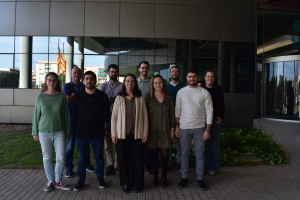A team from the Institute for Corpuscular Physics (IFIC), a joint centre of the Spanish National Research Council (CSIC) and the University of Valencia (UV), is leading a new initiative in the fight against cancer from the field of medical physics. This is the AIDER project (Advanced Imaging Detector for targeted Radionuclide therapy), coordinated by researcher Gabriela Llosá, whose goal is to develop a medical imaging tool for targeted therapy using radioactive atoms or radionuclides. Four European academic groups, one company, two hospitals and a patient association form the consortium that will collaborate on this effort for four years.
Targeted radionuclide therapy (TRT) uses radiopharmaceuticals to selectively deliver radiation to cancer cells within specific target organs. Radionuclides (radioactive atoms) emit radiation as they decay and destroy the cancer cells. Accurate quantification of the radiation dose delivered to lesions and to organs at risk is essential for improving patient safety and reducing side effects.
The AIDER project will build an imaging system based on technology initially developed by the IFIC IRIS group, enhancing its performance through the integration of state-of-the-art detectors and electronics. It will also improve image quality and treatment dosimetry. The system, which will be tested in the hospitals of the consortium, will represent a major step forward towards the clinical application of this technique and will strengthen this research line at the international level.
The consortium brings together experts from Claude Bernard University Lyon 1 and its affiliated institutions CNRS and INSA Lyon; the Centre Léon Bérard Hospital in Lyon and the company DAMAVAN Imaging (France); the Politecnico di Milano (Italy); the Institute of Medical Engineering at Universität zu Lübeck (Germany); and the La Fe University and Polytechnic Hospital in Valencia, as well as the Association of Parents of Children with Cancer of the Valencian Community.
AIDER is a European collaborative project funded by the Horizon Europe programme.
More information:
https://cordis.europa.eu/project/id/101165088

